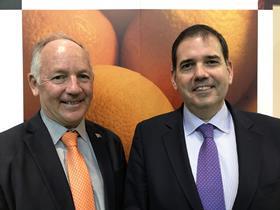
More countries, including Brazil, Uruguay, Turkey and Egypt, are expected to join the newly established World Citrus Organisation, whose formation was confirmed this week in Madrid.
Speaking exclusively to Fruitnet, the two main architects of the group – Justin Chadwick, chief executive of South Africa’s Citrus Growers’ Association and José Antonio García, secretary general of Spanish industry body Ailimpo – said they were confident that other countries would join the six that have agreed to participate so far.
Representatives from Argentina, Chile, Italy, Morocco and Peru were present alongside Chadwick and Garcíato explore how such an organisation might work at a special meeting held on the first morning of the Fruit Attraction trade fair.
They were joined by members of European fresh produce association Freshfel, which will coordinate and administer the new WCO from its office in Brussels, Belgium.
The group’s first official meeting will be held in Berlin next February during the annual Fruit Logistica exhibition, where they will focus on sharing ideas and boosting international consumption of all types of citrus.
“As Ailimpo we think we need to take responsibility and work for the future and forecast how the business is going to behave in the next 10-15 years,” García commented. “We cannot do that alone. We have to do that with our colleagues and our competitors.”
He added: “We have to promote consumption and we can learn from the experience of other countries in fighting diseases, like greening for instance.”
Dismissing as “fake news” the notion that the WCO would act as a lobby group to pressure the EU on market access issues, Chadwick said the need to address a recent decline in consumption of citrus around the world was a primary concern that the association would look to address,
“The fact that Spain is the number one [citrus] exporter in the world and we are number two makes us leaders in our sector when it comes to trade,” he explained.
“We’ve seen the formation of the World Apple and Pear Association, a world cherry association, table grape association, avocado association; we’ve also seen the market share in citrus is actually decreasing compared with these other products. There are good statistics on it that show sales going to avocados and cherries, for example.
“If you go back ten years and look at our share of the fruit basket then versus now, it’s definitely less.”
Joint effort
WCO’s main objective will be to facilitate collective action in the citrus sector, for both fresh and processed categories, it said in a statement.
“Most recently the sector has been faced with an extensive array of significant issues of global concern including growth in production, overlapping of seasons, changing climate conditions resulting in varied quality and biosecurity challenges, increased competition within the citrus category and between other fruit categories and food products as well as stagnating fruit consumption,” it continued.
“The WCO will facilitate member countries to better face these common challenges and identify opportunities for the collective benefit of the citrus sector.”
The association outlined its mission as follows:
• Discuss common issues affecting citrus producing countries.
• Exchange information on production and market trends to prepare for the next decade to come.
• Foster dialogue on policy issues of common concern.
•Identify and promote Research and Innovation projects specific to the citrus sector.
•Liaise with public and private stakeholders on citrus-related matters to highlight the importance of citrus producers and the need for a fair return.
•Promote the global consumption of citrus.
During the official presentation in Madrid, the Director General of Agricultural Production and Markets of the Spanish Ministry of Agriculture, Esperanza Orellana, congratulated the citrus sector for the initiative, emphasising the importance for Spain, leader in the production and export of citrus fruits, to be at the forefront of the project.
The Counsellor of the Region of Murcia, Antonio Luengo, also greeted the participants and expressed his support for the new organisation.
'It is important that the world citrus community works together to face common challenges and learn from each other,' he said, adding that, leaving aside the competitive factor, it was essential to share information and experiences for the collective benefit of the sector, which is of key strategic importance for Murcia and for Spain.



